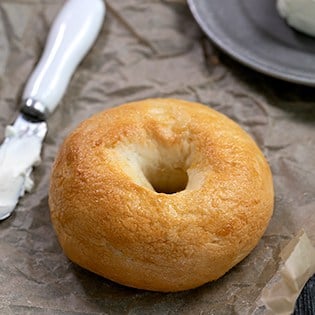
These plain gluten free bagels have the genuine chew inside, and skinny, crisp shell of an actual, boiled bagel. Get pleasure from them with a schmear of cream cheese, or make the perfect sandwich of your life!

Right now I am bringing you a bagel recipe that is about to alter your breakfast sport endlessly. If there’s one factor I’ve realized on my gluten-free journey, it is that nice bread is feasible. It is not solely potential but additionally completely crucial to having fun with our meals—and our lives—with out feeling like we’re lacking out.
As a born and raised New Yorker, chewy, crusty genuine New York-style bagels have at all times been essential to me. Now I convey them to you, gluten free!
Bagels and I am going method again. From the native bagel retailer of my childhood in New York, to the larger, puffier bagels on the famed spots like Ess-a-Bagel and H&H Bagels after I lived in New York Metropolis, bagels have at all times been extra than simply bread to me. They seem to be a connection to my previous, a consolation meals, a flexible snack or meal—and a baking problem I used to be greater than able to deal with.
After many trials and some too many ‘fascinating’ outcomes, I can confidently say I’ve cracked the code on baking gluten-free bagels that aren’t solely nearly as good as their gluten-filled counterparts however might even be higher.
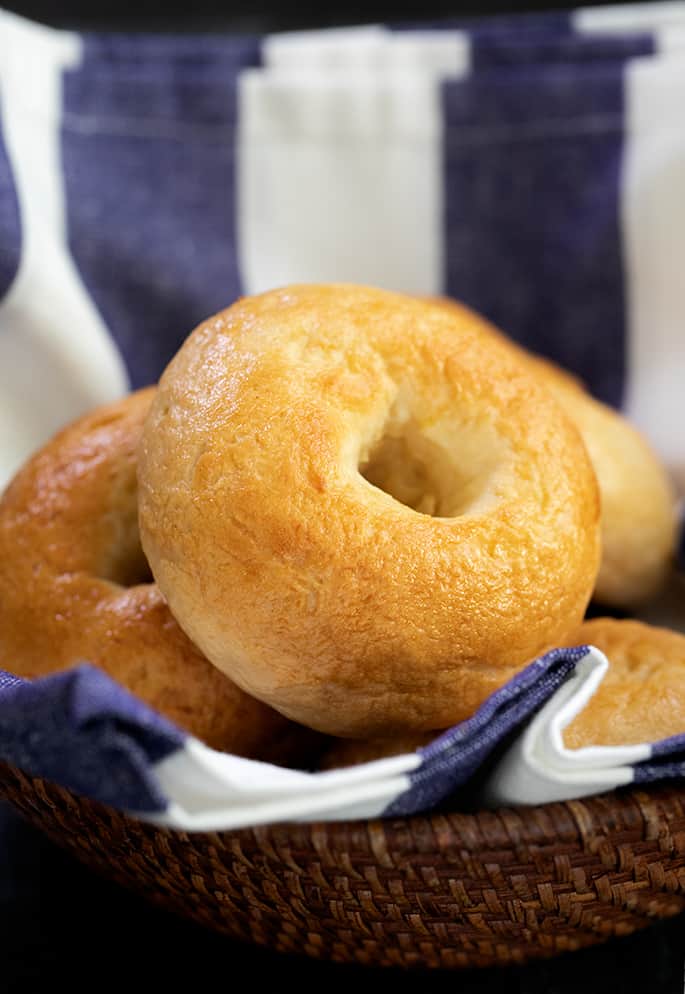
Why you will love this recipe
First off, the feel is solely unmatched. These bagels are crisp on the skin, satisfyingly chewy on the within, identical to actual, boiled bagels are supposed to be.
It’s not simply concerning the texture. It’s additionally concerning the bready, yeasty style that’s excellent whether or not you toast them or not. The method of creating these bagels is genuinely fulfilling and virtually therapeutic, with every stage of preparation changing into part of the enjoyment in creating one thing scrumptious from scratch.
And who does not love a recipe that is forgiving, proper? You do not should be knowledgeable baker to tug off these bagels. It is all about easy components and strategies.
Plus, the flexibility these bagels convey to your kitchen is exclusive. You possibly can take pleasure in them plain, toasted with a little bit of cream cheese, or use them as the inspiration for the right sandwich.
A New York gluten free bagel, of a form
Once I first began growing recipes for bagels, I used to be inclined to make a real New York bagel: one which has a comparatively tight crumb, and is very chewy.
That is the sort of bagel I grew up in NY consuming from the native bagel retailer on the town. The sort the place teenagers labored after college. The sort that’s required at a correct gluten free breakfast or brunch.
Once I lived in New York Metropolis, I ate at locations like Ess-a-Bagel and H&H Bagels. That they had larger, puffier bagels.
They had been nonetheless chewy, however in addition they had a way more ethereal crumb. To me, they tasted fluffy. However they are not actually fluffy. These gluten free plain bagels are like these bagels of my younger maturity.
They don’t seem to be the roll with a gap that you just get from someplace like Dunkin Donuts (bless their hearts). Nobody aspires to that kind of bagel, not even Dunkin Donuts.
Identical goes for all of the packaged gluten free bagels you should buy—not less than all those I’ve tried. They’re bagel-shaped bread.
These bagels are superb contemporary out of the oven. Pile a chunky rooster salad on one, and attempt to conceal your pleasure earlier than you even take a single chew.
They’re additionally superior toasted. First, why would anybody try this with a real contemporary bagel?
However should you’re planning to toast your bagel, chances are you’ll as nicely make a giant batch, allow them to cool fully, slice them by the center, and freeze them. Defrost at room temperature, and toast to perfection.
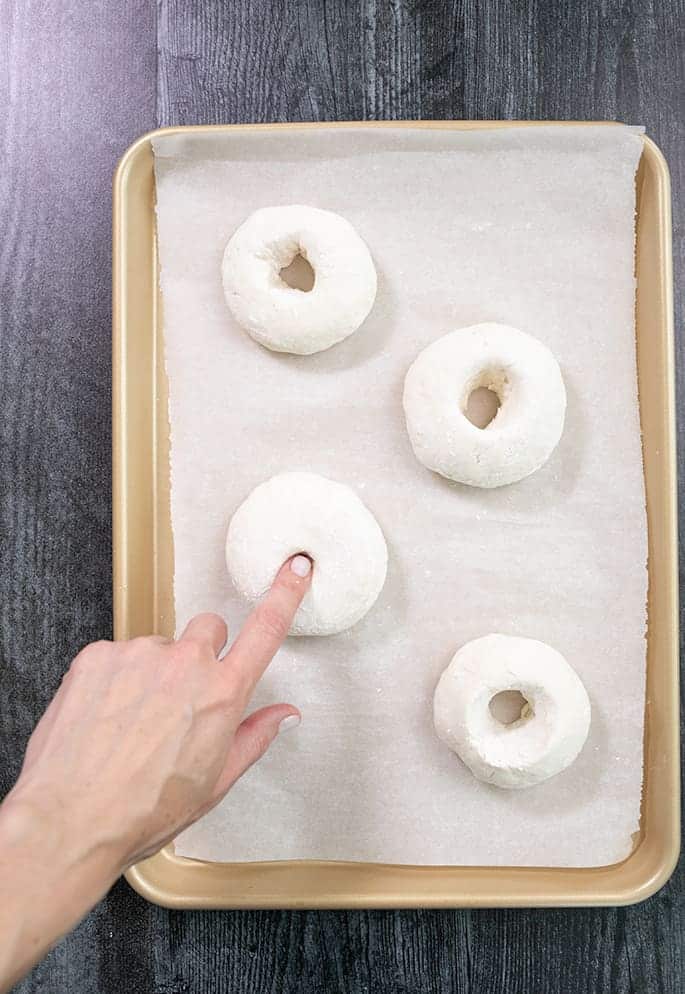
Learn how to make gluten free bagels
Making these gluten-free bagels is actually an fulfilling course of, and whereas it’d look a bit prolonged, it isn’t overly complicated. Let’s break it down.
We start by combining our gluten-free components to create a smooth, workable dough. There isn’t any want for high-end, hard-to-find components, simply common pantry-style gluten-free components are all it takes.
As soon as the components are mixed, we beat them in a stand mixer fitted with the paddle attachment till the dough takes on a whipped look. Then, we chill it for a bit, which makes it simpler to form later and offers the yeast an opportunity to develop some taste.
Talking of shaping, that is our subsequent step. We portion out our dough into particular person items and begin forming our bagels. However there is not any difficult rolling and becoming a member of right here. We simply form the dough right into a spherical after which make a gap within the center.
As soon as our bagels have been formed, we give them a while to rise. They puff as much as about 1.5 instances their unique dimension, creating a pleasant, gentle texture. They received’t double in dimension, so don’t allow them to overproof ready for them to get even larger.
Then comes the half that provides our bagels their genuine style and texture – boiling them in a molasses tub! This step restricts the oven rise a bit and ensures that chewy, traditional bagel texture we’re after.
After a fast boil, the bagels are brushed with egg wash to present them a stunning golden coloration within the oven. Then, into the oven they go till they’ve reached a lovely golden brown and the aroma fills your kitchen.
So, you see, whereas there are a number of levels within the course of, each is simple and provides to the ultimate outcome: chewy, tasty, genuine gluten-free bagels!
Learn how to form gluten free bagels the simple method
Bagels are generally formed by rolling out a cylinder of dough, about 1 1/2-inches thick after which becoming a member of the ends collectively to create a spherical. That isn’t the best way I form or suggest shaping bagels.
When you form your bagel like that, the sides might separate throughout boiling and even throughout baking. Plus, a bagel tastes no totally different if it is formed that method. Perhaps it is only for displaying off? We don’t want that.
I want to form my bagels the simple method. Create a spherical of your portioned piece of dough as you’d some other spherical of dough.
A clean spherical piece of bread dough is formed by cupping your hand across the dough, with the pinky fringe of your hand resting on the floor and your hand in a C form (or a backwards C should you’re proper handed like I’m). Transfer your hang out in a circle, sustaining contact with the floor on the facet of your hand always.
Then, poke a floured finger into the middle and rotate the dough round that finger in concentric circles. When you’re a visible learner and are sighted, watch the how-to video. You will get the dangle of it.
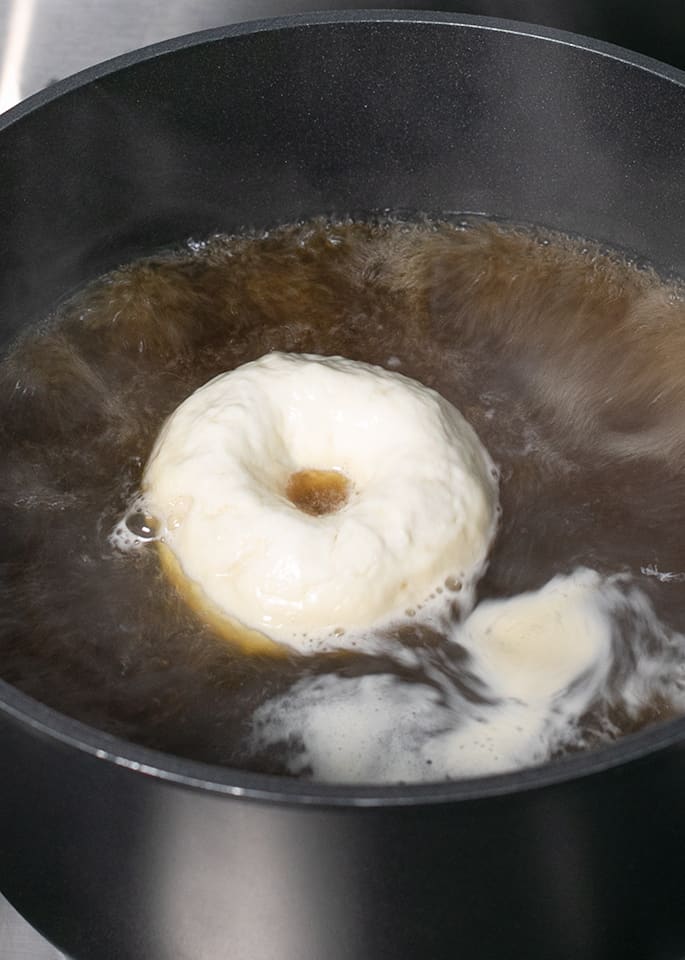
Why these gluten free bagels should be boiled after which baked
After the formed items of dough rise simply sufficient (you solely need it to rise to be about 1 1/2 instances its unique dimension), you are going to boil them in a molasses tub. That is simply 6 cups water with 1 teaspoon kosher salt and 1 tablespoon unsulphured molasses delivered to a rolling boil.
You probably have a cakey bread dough, no quantity of boiling goes to present you a chewy dough. However when you’ve got the appropriate recipe with the correct steadiness of normal pantry-style gluten free components like this recipe, boiling your formed and risen bagels will hold them from rising an excessive amount of within the oven and make them chewy.
When the bagels’ oven rise is only a bit restricted, you’re rewarded with a chewy bagel. Make certain to not allow them to rise an excessive amount of as soon as they’re formed, or your bagel dough will absorb water like a sponge and disintegrate throughout boiling.
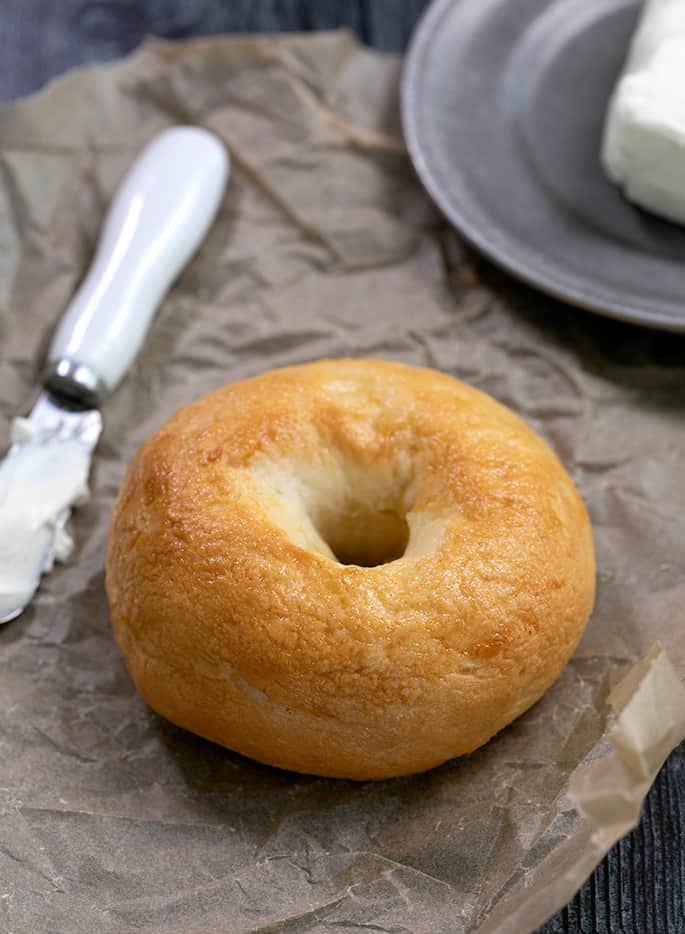
Substitutions for gluten free bagel components
I would watch out with altering any of the components right here. This recipe works due to the appropriate components in the appropriate portions. However, should you do wish to attempt, listed here are my finest guesses. However no guarantees!
Gluten free dairy free bagels
The dairy on this recipe comes from butter and milk powder. The milk powder you utilize could be nonfat dry milk or complete milk powder. Entire milk powder makes a barely richer outcome.
To switch the milk powder with a dairy-free different, coconut milk powder ought to work. I like Native Forest model, however there are lots of others accessible now, together with Anthony’s model.
Rather than butter, vegan butter ought to work. I like Miyoko’s Kitchen or Soften model vegan butters finest.
Gluten free egg free bagels
When you can’t have egg whites, you possibly can attempt changing the egg white with an equal quantity, by weight, of aquafaba, which is the brine from a can of chickpeas. Attempt beating the aquafaba till foamy with a whisk earlier than including it to the dough.
Rather than the egg wash on the skin of the bagels, attempt utilizing melted butter or cream!
Do it’s important to use additional tapioca starch/flour, even when your all goal GF mix comprises it?
Sure! You need to use tapioca starch as a separate ingredient.
All correct all goal gluten free flour blends have tapioca starch within the mix. Right here you want a contact extra.
There is no such thing as a different starch that I can suggest as an ideal substitute for tapioca starch/flour. It offers construction, stretch and a smoothness to the dough that I’ve actually come to depend upon in lots of bread recipes.

Straightforward Gluten Free Bagels
These plain gluten free bagels have the genuine chew inside, and skinny, crisp shell of an actual, boiled bagel. Get pleasure from them with a schmear of cream cheese, or make the perfect sandwich of your life!
Yield: 8 bagels
Forestall your display screen from going darkish
Components
- 2 ¾ cups (385 g) all goal gluten free flour mix (I used Higher Batter; click on by for full information)
- 1 ½ teaspoons xanthan gum omit in case your mix already comprises it
- ½ cup (72 g) tapioca starch/flour plus extra for sprinkling
- ¼ cup (40 g) milk powder
- 1 tablespoon (9 g) immediate yeast (See Recipe Notes)
- 2 tablespoons (24 g) granulated sugar
- 1 teaspoon kosher salt
- 1 (25 g) egg white at room temperature
- 6 tablespoons (84 g) unsalted butter at room temperature
- 1 ⅜ cups (11 ounces) heat water (about 95°F)
- Molasses tub 6 cups water + 1 teaspoon kosher salt + 1 tablespoon unsulphured molasses
- Egg wash 1 egg + 1 tablespoon lukewarm water, overwhelmed
Directions
To make the bagel dough.
-
Within the bowl of a stand mixer, place the flour, xanthan gum, tapioca starch/flour, milk powder, immediate yeast, and granulated sugar, and whisk to mix nicely. Add the salt, and whisk once more to mix.
-
Create a nicely within the heart of the dry components and add the egg white, butter, and heat water, and blend to mix nicely.
-
Place the bowl within the stand mixer fitted with the paddle attachment and beat on medium pace. The dough will clump at first.
-
As soon as it begins to clean out, enhance the pace to medium-high and proceed to beat till the dough takes on a whipped look.
-
Switch the dough to a container with a lid, cowl, and chill for about half-hour (and as much as 2 days) to make the dough simpler to work with.
Form the bagels.
-
Whenever you’re able to form the bagels, line a rimmed baking sheet with parchment paper, spray it calmly with cooking oil spray, and set it apart.
-
Sprinkle a floor calmly with tapioca starch, and end up the chilled dough onto it. Sprinkle once more calmly with extra tapioca starch, and switch the dough over a number of instances to clean the floor.
-
Utilizing a pointy knife or bench scraper, divide the dough in half, then every half into 4 equal items to make 8 items whole.
-
Working with one piece at a time, sprinkling very calmly with extra tapioca starch to forestall sticking, press the dough right into a roughly formed spherical, pinching collectively any cracks.
-
Form the dough right into a spherical by inserting it flat on the shaping floor and transferring a cupped hang out in a round movement to coax it right into a spherical. Sprinkle the highest liberally with extra tapioca starch and poke a floured finger into the middle.
-
Transfer that finger in a round movement to create a gap about 1 1/2-inches in diameter. Place the formed dough on the ready baking sheet. Repeat with the remaining dough.
Let the bagels rise.
-
Cowl the baking sheet with calmly oiled plastic wrap, and put aside to rise till the bagels are about 150% of their unique dimension.
-
Rising might take as little as about 40 minutes, or it might take for much longer. It relies upon upon the setting in your kitchen. When you see the floor of the bagels start to turn out to be very uneven, with craters forming, cease proofing instantly.
-
Preheat your oven to 375°F.
Boil the risen uncooked bagels.
-
Because the bagels are nearing the tip of their rise, place the components for the molasses tub in a heavy-bottom saucepan and convey to a rolling boil over medium warmth.
-
Place as most of the bagels within the tub as you possibly can match with out crowding them in any respect, and boil for about 45 seconds whole, turning the dough over for even boiling.
-
Take away the bagels from the bathtub with a slotted spoon or strainer, and return them to the baking sheet. Brush the bagels generously with the egg wash.
Bake the bagels.
-
Place the baking sheet within the heart of the preheated oven and bake for quarter-hour.
-
Rotate the baking sheet within the oven and proceed to bake for an additional 10 to fifteen minutes or till golden brown throughout and a thermometer inserted right into a bagel reads 180°F.
-
For a thicker crust, enhance the oven temperature to 400°F and bake for an additional 7 or 8 minutes. Take away the baking sheet from the oven and permit the bagels to chill till they’re not too sizzling to deal with earlier than serving.
Notes
When you don’t have immediate yeast, you need to use energetic dry yeast in a bigger amount.
The conversion is to multiply the burden of the moment yeast (right here, 9 grams) by 125% (9 grams x 1.25 = 11.25 grams; simply use a tiny bit greater than 11 grams).
All goal gluten free flour
Please comply with the hyperlink within the recipe for a full dialogue of the all goal gluten free flour blends will and won’t work in my recipes. That is notably essential in bread recipes.
I at all times get numerous feedback and emails from readers who’ve used a gluten free flour mix like Bob’s Crimson Mill, King Arthur Flour, or Namaste, complaining that the recipe doesn’t work as written. You can’t use these blends in my recipes and count on constant, if any good, outcomes.
Straightforward Gluten Free Bagels
These plain gluten free bagels have the genuine chew inside, and skinny, crisp shell of an actual, boiled bagel. Get pleasure from them with a schmear of cream cheese, or make the perfect sandwich of your life!
Yield: 8 bagels
Forestall your display screen from going darkish
Components
- 2 ¾ cups (385 g) all goal gluten free flour mix (I used Higher Batter; click on by for full information)
- 1 ½ teaspoons xanthan gum omit in case your mix already comprises it
- ½ cup (72 g) tapioca starch/flour plus extra for sprinkling
- ¼ cup (40 g) milk powder
- 1 tablespoon (9 g) immediate yeast (See Recipe Notes)
- 2 tablespoons (24 g) granulated sugar
- 1 teaspoon kosher salt
- 1 (25 g) egg white at room temperature
- 6 tablespoons (84 g) unsalted butter at room temperature
- 1 ⅜ cups (11 ounces) heat water (about 95°F)
- Molasses tub 6 cups water + 1 teaspoon kosher salt + 1 tablespoon unsulphured molasses
- Egg wash 1 egg + 1 tablespoon lukewarm water, overwhelmed
Directions
To make the bagel dough.
-
Within the bowl of a stand mixer, place the flour, xanthan gum, tapioca starch/flour, milk powder, immediate yeast, and granulated sugar, and whisk to mix nicely. Add the salt, and whisk once more to mix.
-
Create a nicely within the heart of the dry components and add the egg white, butter, and heat water, and blend to mix nicely.
-
Place the bowl within the stand mixer fitted with the paddle attachment and beat on medium pace. The dough will clump at first.
-
As soon as it begins to clean out, enhance the pace to medium-high and proceed to beat till the dough takes on a whipped look.
-
Switch the dough to a container with a lid, cowl, and chill for about half-hour (and as much as 2 days) to make the dough simpler to work with.
Form the bagels.
-
Whenever you’re able to form the bagels, line a rimmed baking sheet with parchment paper, spray it calmly with cooking oil spray, and set it apart.
-
Sprinkle a floor calmly with tapioca starch, and end up the chilled dough onto it. Sprinkle once more calmly with extra tapioca starch, and switch the dough over a number of instances to clean the floor.
-
Utilizing a pointy knife or bench scraper, divide the dough in half, then every half into 4 equal items to make 8 items whole.
-
Working with one piece at a time, sprinkling very calmly with extra tapioca starch to forestall sticking, press the dough right into a roughly formed spherical, pinching collectively any cracks.
-
Form the dough right into a spherical by inserting it flat on the shaping floor and transferring a cupped hang out in a round movement to coax it right into a spherical. Sprinkle the highest liberally with extra tapioca starch and poke a floured finger into the middle.
-
Transfer that finger in a round movement to create a gap about 1 1/2-inches in diameter. Place the formed dough on the ready baking sheet. Repeat with the remaining dough.
Let the bagels rise.
-
Cowl the baking sheet with calmly oiled plastic wrap, and put aside to rise till the bagels are about 150% of their unique dimension.
-
Rising might take as little as about 40 minutes, or it might take for much longer. It relies upon upon the setting in your kitchen. When you see the floor of the bagels start to turn out to be very uneven, with craters forming, cease proofing instantly.
-
Preheat your oven to 375°F.
Boil the risen uncooked bagels.
-
Because the bagels are nearing the tip of their rise, place the components for the molasses tub in a heavy-bottom saucepan and convey to a rolling boil over medium warmth.
-
Place as most of the bagels within the tub as you possibly can match with out crowding them in any respect, and boil for about 45 seconds whole, turning the dough over for even boiling.
-
Take away the bagels from the bathtub with a slotted spoon or strainer, and return them to the baking sheet. Brush the bagels generously with the egg wash.
Bake the bagels.
-
Place the baking sheet within the heart of the preheated oven and bake for quarter-hour.
-
Rotate the baking sheet within the oven and proceed to bake for an additional 10 to fifteen minutes or till golden brown throughout and a thermometer inserted right into a bagel reads 180°F.
-
For a thicker crust, enhance the oven temperature to 400°F and bake for an additional 7 or 8 minutes. Take away the baking sheet from the oven and permit the bagels to chill till they’re not too sizzling to deal with earlier than serving.
Notes
When you don’t have immediate yeast, you need to use energetic dry yeast in a bigger amount.
The conversion is to multiply the burden of the moment yeast (right here, 9 grams) by 125% (9 grams x 1.25 = 11.25 grams; simply use a tiny bit greater than 11 grams).
All goal gluten free flour
Please comply with the hyperlink within the recipe for a full dialogue of the all goal gluten free flour blends will and won’t work in my recipes. That is notably essential in bread recipes.
I at all times get numerous feedback and emails from readers who’ve used a gluten free flour mix like Bob’s Crimson Mill, King Arthur Flour, or Namaste, complaining that the recipe doesn’t work as written. You can’t use these blends in my recipes and count on constant, if any good, outcomes.


